Canada Condemns Government Violence Against Iranian Protesters
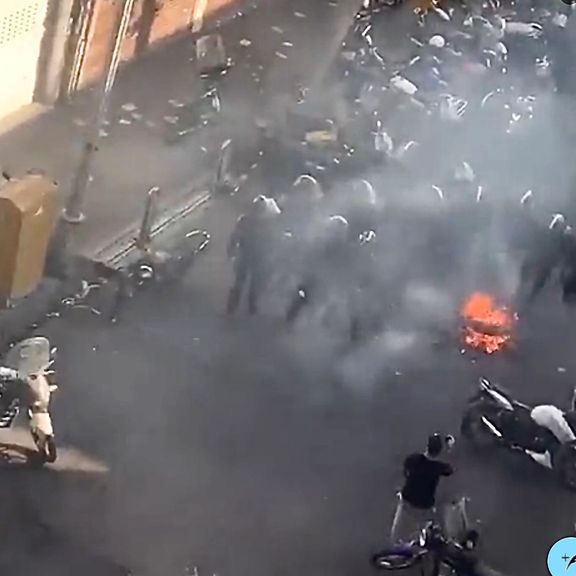
Canada’s Ministry of Foreign Affairs has strongly condemned the detention of demonstrators and the violent suppression of civilians in Iran.

Canada’s Ministry of Foreign Affairs has strongly condemned the detention of demonstrators and the violent suppression of civilians in Iran.
In response to Iran International, a spokesperson for Canada’s Global Affairs Department categorically condemned Iran’s arrest of protestors and the continuing violent crackdown on people, which has caused additional deaths and injuries in blatant violation of their human rights.
“We urge Iran to meaningfully address the grievances of all of its citizens without discrimination and to protect and respect their right to peaceful protest,” said the spokesperson.
“We salute the courage of all Iranians, especially women and girls, who are exercising their right to freedom of expression and freedom of peaceful assembly and association. We join them in sending the regime a very clear message: they must end all forms of persecution and violence against women.”
On the other hand, Canada's ministers of foreign affairs, international development and the minister responsible for the Pacific Economic Development Agency of Canada, wrote in a joint statement that Ottawa will continue to stand firmly with the Iranian people and for the human right of women, girls and gender-diverse people.
“Right now, women in Iran are leading a powerful and necessary call to end violence against women and girls. The killing of Mahsa Amini while in the custody of the so-called morality police has sparked a courageous, global movement to stand up for a more fair and inclusive future for women and girls in Iran,” reads the statement.
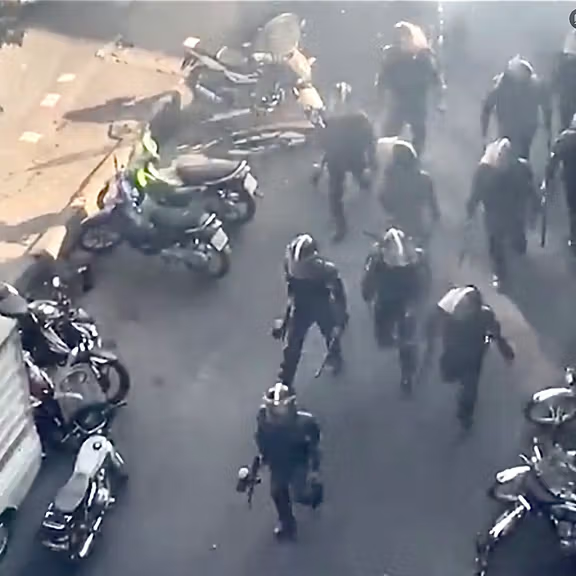
Iranian human rights activists monitoring the situation say the number of people killed in nationwide protests has risen to at least 448 as of Friday, November 25.
The US-based Human Rights Activists News Agency (HRANA) announced in its latest report that from September 16 until Friday, November 25, at least 448 protestors have been killed, of which 63 were minors.
While the Islamic Republic has not provided accurate figures of those detained in the protests, the watchdog went on to say that at least 18,170 protesters have been arrested including 565 students.
HRANA added that156 cities and more than 140 universities across Iran have also been the scenes of anti-government protests.
The group added that 3,234 of the arrested protesters have been identified, saying that 110 are minors.
Meanwhile, “Kurdistan Human Rights Network”, which is a France-based independent organization said at least 104 Kurdish citizens were killed in nationwide protests until Friday, November 25.
The United Nations Human Rights Council on Thursday adopted a resolution based on which an international panel will be formed to investigate the violence against protesters in Iran.
The members of the fact-finding panel will be appointed by the President of the United Nations Human Rights Council, and its mission is to investigate human rights violations since the beginning of Iran's nationwide protests and document the role of its perpetrators.
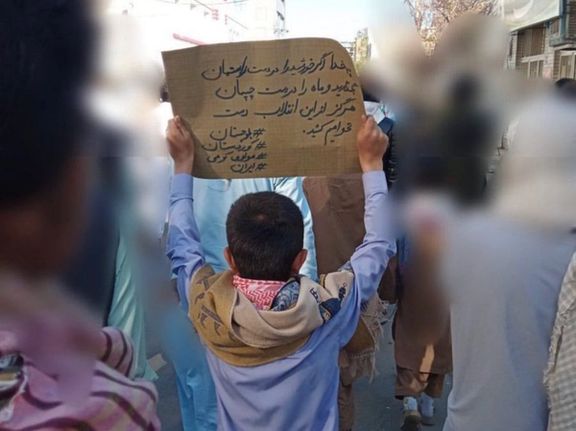
Friday, 26 November, will remain in the history of Iran forever as some security forces were killing people in Kurdish and Baluch cities but were dancing before cameras in Tehran.
Following a tough Friday prayer sermon by Iran’s leading Sunni cleric, people in the southeastern province of Sistan and Baluchestan poured onto streets in several cities in support of the people in Kurdish-majority cities in western Iran. Protesters in provincial capital Zahedan, Chabahar, Khash, Saravan, and Iranshahr were out in streets until late in the night, chanting slogans for freedom and the end of the clerical regime. A noteworthy slogan was “Kurds and Baluchis are brethren, all thirsty for the blood of the leader.”
In many cities they were confronted by the security forces who used gunfire and teargas, killing several people. But in the capital Tehran, security forces apparently were ordered to celebrate for the victory of Islamic Republic’s football team in its second World Cup match, creating a surreal scene that is bound to remain in the history of the country.
Defying the resentment of many Iranians over government’s killing of 400 people, including about 50 children, in the past two months, the players of the national squad sang along with the Islamic Republic anthem at the beginning of their match against Wales and won the game to keep their hopes alive for qualifying to the knockout stage of the tournament. But people on social media have been slamming them for their disregard toward the bloodshed in Iran. Protesting Iranians also chanted slogans in support of popular footballer Vorya Ghafouri, who was arrested for his outspoken support for protesters.
Late on Friday, people in several neighborhoods of the capital Tehran, the neighboring city of Karaj and the central city of Esfahan held antigovernment gatherings and chanted slogans against the regime.
One of the highlights of the day for Iranians was the hacking of Fars news website, a media outlet affiliated with Iran’s Revolutionary Guard, which promotes the Islamic Republic’s agenda in several languages. The website of Fars News Agency was targeted by Iranian hacktivist group Black Reward and the agency’s databases which include confidential news bulletins sent to Supreme Leader's office and IRGC as well as all their recorded calls, correspondence, and financial data were breached.
Moreover, the commander of IRGC ground forces announced Friday that it has been reinforcing its military on the border with Iraq adjacent to the Kurdistan autonomous region with armored units.
Iran has deployed military firepower against Iranian Kurdish civilian protesters in western Iran, killing at least 12 people since November 16. It has also repeatedly shelled bases of Iranian Kurdish insurgent groups in Iraq, portraying the popular protests as a separatist movement. Mohammad Esmail Kowsari, a former IRGC commander and currently a member of the Islamic Republic parliament, also confirmed that military units were being dispatched to deal with Kurdish insurgents in Iraq.

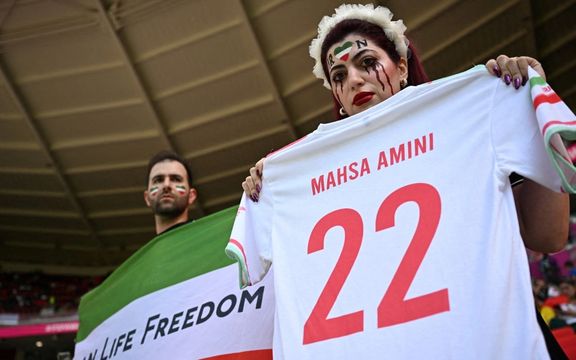
Iran’s soccer team blanked 10-man Wales Friday as World Cup host Qatar prevented Iranian fans from expressing their support for the ongoing protests in their the country.
Iranian fans, who wanted to take flags other than the official one approved by the Islamic Republic to the Al Rayyan’s Ahmad bin Ali Stadium, were stopped by security officers. Many people were barred from carrying or waving Iran’s ancient flag with the Lion and Sun emblem or a simple three-color flag with the main motto of the current wave of protests – Woman, Life, Liberty.
Rebuking the Qatari police for such a close collaboration with the Islamic Republic, Iran International presenter Reza Mohaddes said that organizers of the event have even set up patrols during to match to stop and expel those who have managed to sneak in some flags or other symbols in solidarity with the protests back home.
He quoted officials of the Islamic Republic’s Football Federation as saying that in addition to the country’s officials and state media reporters, more than 22,000 free tickets -- about 7,000 per match --have been provided for the country’s cherrypicked supporters to go to Qatar from Iran. Masquerading as “cultural agents,” these people are mainly in charge of populating the stadiums carrying the regime’s flags or symbols.
Moreover, there are videos and photos of Bangladeshi and Pakistani citizens – reportedly workers who helped built Qatar’s stadiums under inhumane working conditions – paid to pose as Iranian football fans, carrying the Islamic Republic’s flags.
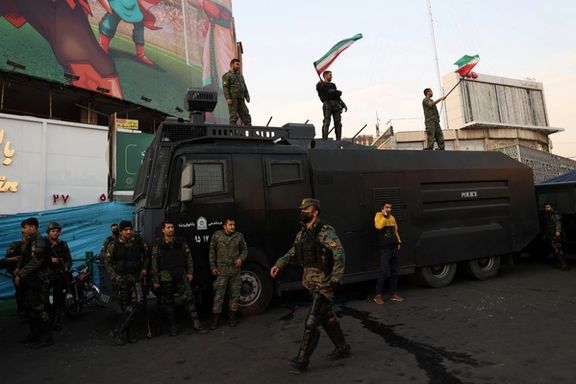
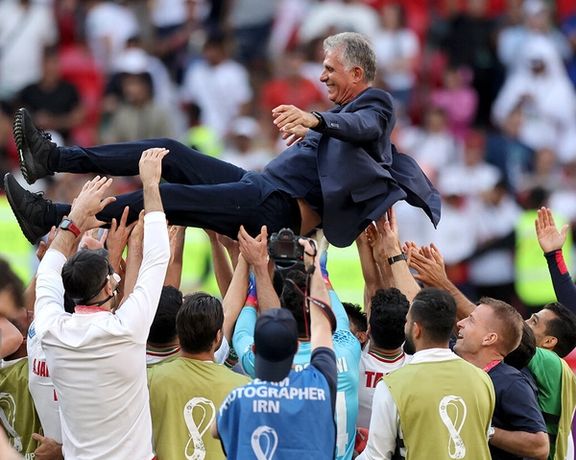
Another thing that has irked Iranians in the country and abroad is how the players cheered after their 2-0 victory against Wales, while almost none of the footballers playing at the country’s premier league cheer after scoring or winning in honor of the bereaved families of the protesters killed in the past 70 days.
Last month, Iranian President Ebrahim Raisi expressed concern over possible problems that may happen during the FIFA World Cup, tacitly referring to people chanting slogans against the Islamic Republic during matches or players making statements about the situations in Iran. Earlier in November, he tasked the Foreign Ministry to contact Qatari officials regarding the issue to find ways “to predict and prevent possible problems."
Mohaddes added that Qatar is also cooperating with the Islamic Republic to better censor the broadcast of the matches. The Islamic Republic state broadcaster has always been censoring scenes from the spectators who were carrying placards or flags to show their opposition to the regime. The censorship also meant to block images of normally dressed women among spectators in matches that took place outside Iran.
However, it had to find innovative measures to keep airing the live matches, such as finding an insert shot that it deemed appropriate and replaying it whenever it wanted to censor the footage. But this time Qatar solved this problem for the Islamic Republic by providing a live clean long shot of the stadium to be used instead of close-up shots of flags or an expression of solidarity with the uprising.
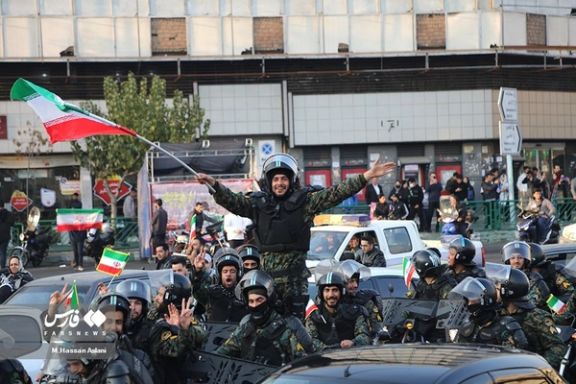
Unlike their first match, this time the Iranian squad disregarded people’s feelings by singing along with the Islamic Republic anthem. Loud jeers were heard from Iranian supporters inside the stadium as the anthem played, with the team singing quietly along.
Numerous Iranian athletes have shown support for the protests. The Iranian football, beach football, water polo, basketball, and sitting volleyball teams refused to sing along with the anthem, which is customary in almost all international competitions. Authorities have made serious threats against athletes and other celebrities to stop them from public displays of solidarity with protesters but to no avail.
According to Mohaddes, Iranians expected Team Melli to do something more than staying silent during the anthem, especially after the arrest of popular footballer Vorya Ghafouri for his outspoken support for protesters, but players even did not repeat the banal gesture they did in their World Cup opener.
Team Melli players even disappointed people by refusing to talk about or even answer questions about the current situation in Iran on the eve of their match against Wales, claiming that they are not people of politics.
Team Melli should rather be called “the representatives of the Islamic Republic” as they can no longer be Iran’s national squad, Mohaddes noted.

A senior Iranian Revolutionary Guard commander has said that those who chant “Woman, Life, Freedom” are the soldiers of the “enemy”, who wants to weaken Islam.
After the killing of Mahsa Amini, a 22-year-old woman by 'morality police' in September protests ignited across Iran with the slogan of "Woman, Life, Freedom."
General Mohammad Reza Naghdi (Naqdi) the deputy commander of the Islamic Revolution Guard Corps (IRGC) who was speaking Friday at a gathering of officers in northern Iran, went on to blame enemies for a “media war” during the ongoing protests.
Iran’s Supreme Leader Ali Khamenei and other top officials have been blaming the popular protests on conspiracies pursued by “enemies”, which usually mean the United States and its allies in the Islamic Republic’s jargon.
Naghdi said there is “a psychological war” being waged against the Islamic regime and the aim is “core religious beliefs” including the principle of a clerical supreme leader ruling over the Islamic nation, or ‘umma’. The IRGC general claimed that the majority of the Iranian people stand behind the regime, without mentioning the more than 400 protesters killed since mid-September.
However, he repeated officials claims that unknown individuals are killing innocent people to blame the government, while hundreds of videos on social media show security forces using indiscriminate violence in the streets.
Complaining about sanctions, Naghdi insisted that the majority of the people are ready to support the government to overcome economic hardships.
He also praised Jihadi volunteers, who act as plainclothes agents during the protests and are often responsible for killing and injuring civilians.
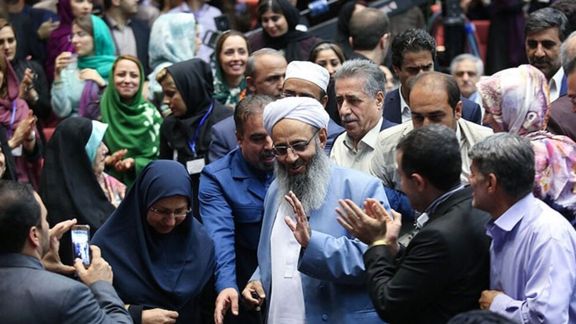
A top Sunni cleric has dismissed the Islamic Republic’s efforts to garner the support of the reformists to help contain ongoing unrest, saying the opportunity for reforms is lost.
In his Friday prayers sermons, Mowlavi Abdolhamid, officially known as Mowlavi Shaikh Abdolhamdid Esmailzehi, said whenever people were willing to go to the polls and vote for the reformist camp, they disappointed them with their inaction.
“The time was wasted, and we have lost the opportunity for reforms," said the religious leader of Iran's largely Sunni Baluch population living in the southeastern province of Sistan and Baluchestan.
"The reformists did not manage to do anything, and the biggest complaint directed at them is why they did not enact any reforms,” he said. Indirectly referring to the Supreme Leader and possibly the Revolutionary Guards and hardliners, Abdolhamid said that if reformists were stopped from pursuing reforms, “why didn't they say who stopped them? Why did they remain silent? Those who came in the name of reformism and did not do anything should have had the courage to say who didn't allow them," he said.
Emphasizing that reformists have lost their chance, he said that “If reforms had been carried out in the Islamic Republic, today the people would not be suffering from miseries, and they would not be shouting for freedom and justice during their protests.”
Mowlavi Abdolhamid, who had previously supported Reformist President Mohammad Khatami (1997-2005) and moderate conservative Hassan Rouhani (2013-2021), encouraged Iran's Sunni population to support ultraconservative Ebrahim Raisi in the 2021 presidential election. Later he complained that Raisi failed to fulfil his promises to the Sunni community while millions had voted for him. Following the killing of more than 100 Sunnis in Zahedan during recent protests by security forces, some criticized Abdolhamid for having supported Raisi.
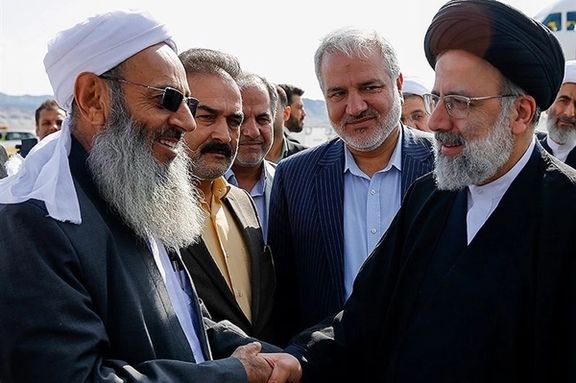
At the start of the reform movement in 1997, Abdolhamid played a key part as a charismatic leader who rallied the Sunnis behind Khatami. The history of the Islamic Republic reveals that any candidate who had Abdolhamid's support won the election in Sistan and Baluchistan and Kordestan provinces.
Abdolhamid's popularity is largely because of his willingness to challenge the absolute authority of Supreme Leader Ali Khamenei. Earlier in November, the outspoken Sunni Imam said women, ethnic and religious groups, and minorities have faced discrimination after the establishment of the Islamic Republic in 1979. He was also brave enough to blame Khamenei for the attack on protesters in his hometown, Zahedan.
He made the remarks on the backdrop of reports from recent meetings between senior officials and a number of reformist figures. Sources in Tehran say Iran's ruling hardliners are beseeching once popular reformists they purged from power to help save the regime and end the uprising. However, the reformists have been side-lined during the current wave of the protests – ignited by the death in custody of Mahsa Amini, as neither the government nor the protesters consider them a serious political alternative.
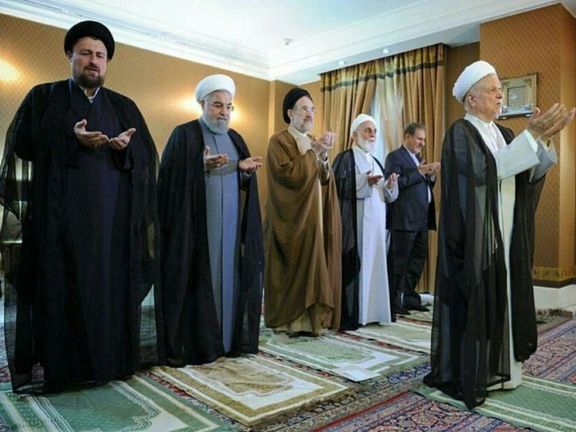
During his Friday prayers sermons, Mowlavi Abdolhamid also criticized the crackdown on the Kurdish majority cities in western Iran, praising them as one of the best ethnic groups who protected the borders like the people of Sistan and Baluchestan.
Since last week, the Islamic Republic has intensified its repression of Kurdish-majority cities and towns following reports that parts of some small towns have fallen into the people’s hands. The majority of Iran's 10 million Kurds live in the western parts of the country.
"Now that the people of Kordestan are complaining about their problems and protesting, they should not be shot at, and they should not be treated with violence," he said.
He added that if he were an official, he would listen to the peoples’ demands, noting, "It is a matter of concern that many of our officials were not ready to listen to the critics. These problems were created by those who did not allow criticism."
Taking issue with spending Iran’s money in other regional countries, the cleric said, "This country does not belong to officials and rulers. It belongs to all of us and we all want this country to be prosperous. Its wealth should be spent here instead of somewhere else."
He also called on the authorities not to give "severe sentences" to protesters and urged the release of the political prisoners, referring to death sentences issued for at least 10 people.
Expressing concern about reports of torture and sexual harassment of prisoners, Abdolhamid cautioned, "There are some reports of mistreatment of prisoners, especially female prisoners, that are difficult for me to say... Torture is against the constitution and is not allowed in any religion."